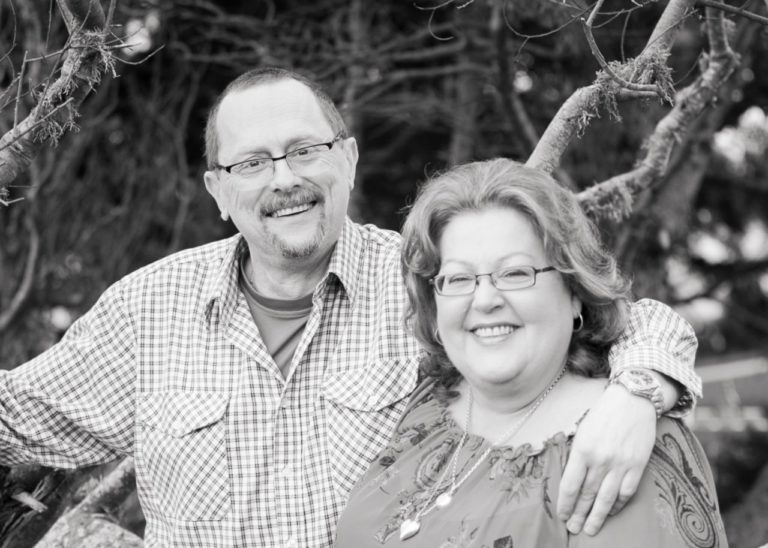
WECARE.NZ CAMPAIGN STORY
Wendy Slieker

Sandwich generation caregiving
Life can change in a flash, with none of us immune.
No one knows that better than Wendy Slieker and her husband Steve Kallipolitis.
Steve, an engineer, experienced a sudden cardiac arrest while out running in 2011. His heart stopped for 27 minutes, leading to a severe brain injury.
Wendy has an extensive background as a senior administrator and manager in a range of industries: legal, insurance, the arts, and the voluntary sector. Before Steve’s brain injury, she had left employment to care for her mother-in-law, who had terminal liver cancer. After her death, Wendy experienced health concerns of her own and was unable to return to work.
“I did manage to maintain my volunteer work with the Ronald McDonald Family Room at Wellington Hospital and as a trustee of the Warren Douglas Scholarship Fund to support professional development in arts management.”
Previously she led a number of tours on behalf of The Royal New Zealand Ballet throughout Europe and the Americas, and is a past Executive Director of the New Zealand Women’s Refuge Foundation.
Despite her successful career and the experience of caring for her mother-in-law, Wendy says she was unprepared for what lay ahead.
“Vulnerable and naive – two words I would never have used to describe my husband or myself. How wrong could we be? December 2011 set off a chain of events that put us on a collision course of discovery and vulnerability that up to that point was unimaginable.”
She says Steve’s abrupt collapse gave them no time to adjust emotionally, psychologically, or financially.
“You feel like you’re drowning as you try to make sense of this world that you are totally unprepared for. In a caring role, you lose your identity as a person, a lover and a partner. You become a doctor, a nurse, a psychologist, a therapist, an advocate and a whole lot of other things you have absolutely no training for.”
Steve spent 9 weeks in hospital following his injury, dealing also with his subsequent heart deficits and a major bowel bleed caused by the drugs he was given in ICU. He spent a further 9 weeks in a brain injury rehab facility before being discharged home.
Wendy and Steve then faced major recovery hurdles and adjusting to life with ongoing health challenges. Wendy has provided Steve with significant day to day support for more than 12 years.
She says she often feels guilty that her own health and emotional reserves have been depleted by years of stress.
Like many New Zealand women, Wendy has multiple caring roles – she had ‘sandwich generation’ responsibilities for both Steve and her elderly Dad, who lived independently but required assistance to continue living at home until his death in 2021.
Wendy and Steve received little government support over the years, and Steve’s injury disrupted their ability to save for retirement, creating financial pressures as they aged.
“Being 10 years out from retirement, we were well set up financially with my husband in a high earning profession, and we had a rental property portfolio and superannuation savings. Sadly, when my husband suffered his injury, this careful planning placed us in a position where we were not eligible for any sort of assistance, not even a Community Services Card. We have been living off our savings since.”
As a spouse, Wendy is ineligible for the Supported Living Payment for the support she provides for Steve. However Steve now receives 54 hours of Individualised Funding support each fortnight. The couple also have 40 days a year of Carer Support Subsidy, so Wendy can rest and recharge.
Wendy says many forms of assistance financial or medical are means tested, which reduces options for state-funded support for the couple.
It’s hard to use respite allocations, as Steve’s brain injury makes him wary of strangers; he refuses to allow caregivers into their home, or to access residential respite. The only available facility-based respite in their area is in a dementia care unit, which is unsuitable for Steve.
Respite is becoming more important because Wendy’s own health is fragile. Last year she contracted COVID, requiring hospitalisation, and is still recovering from its long-term effects.
Despite the pressures of caring for multiple members of her family, Wendy says she has learned to live in the moment and accept help from those who offer it.
“From day one you find out how draining negotiating the health and rehabilitation systems are. Trust your instincts amongst all the chaos and uncertainty. Never stop asking questions. Advocate for your loved one. Be their voice if they need it. You will get through everything and come out the other end wiser and possibly stronger.”
